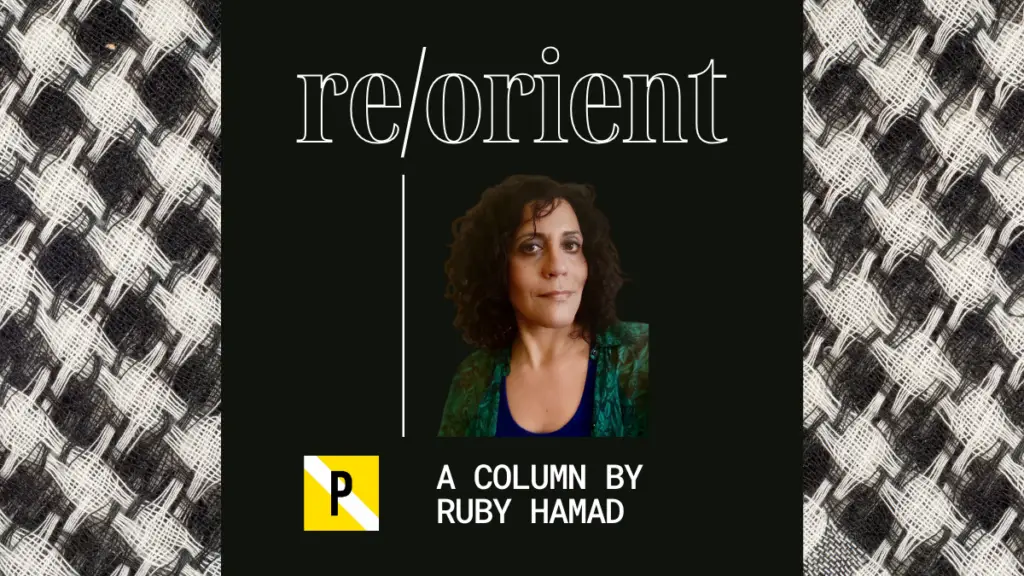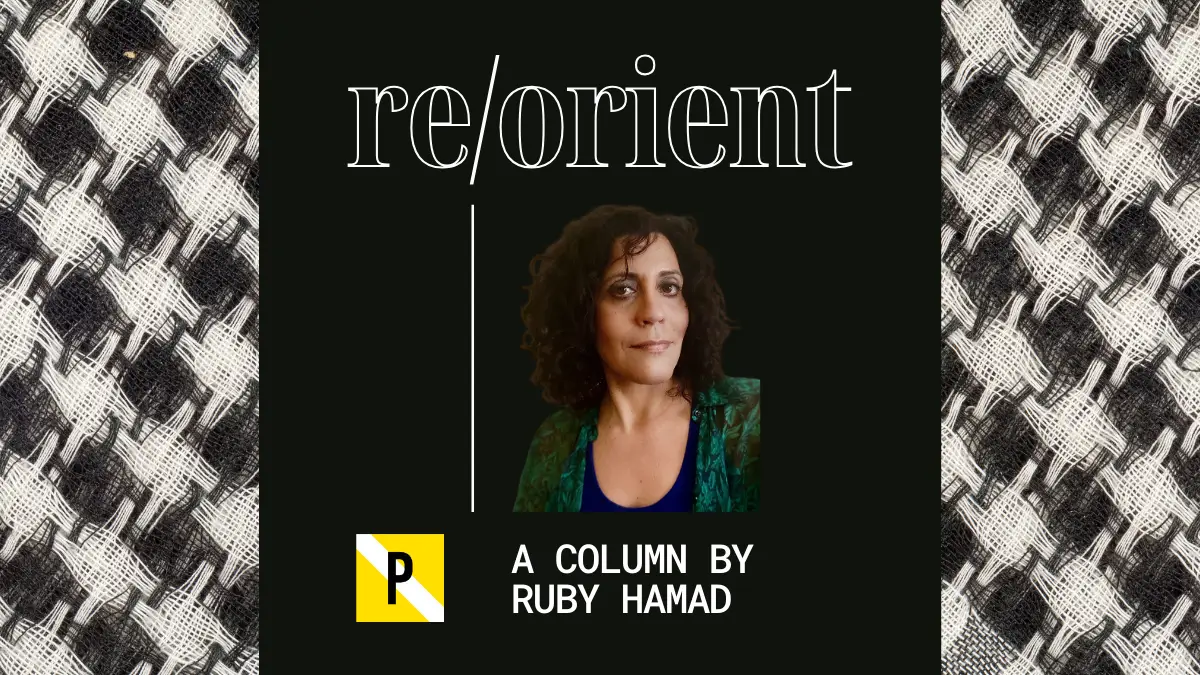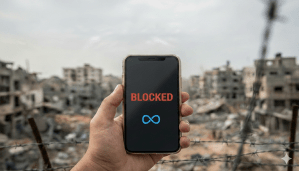

Re-Orient is a new column by Ruby Hamad.
The Israeli assault on Gaza, now nearing its first-year anniversary, has thoroughly decimated the official Western narrative on the Israel-Palestine “conflict.” For decades, Western political and media discourse has framed Israel’s occupation of Palestine as a David and Goliath battle, with Israel as a valiant underdog bravely taking on a monstrous, barbaric enemy, and the US as an “honest broker” desperately trying to secure a lasting peace.
It’s not Israel’s sadistic violence itself that has caused this seismic shift in how we use and relate to visual culture. Rather, it’s how directly these images disprove Israeli and US government talking points about precision strikes and self-defence.
The torture and assault of Palestinians in Gaza and Israeli prisons is reminiscent of Abu Ghraib, for example. Yet here, there are no leaks or whistle-blowers: the ones responsible for these war crimes are the same ones posting and boasting about them.
Palestinian journalists and citizens livestreaming their own annihilation has also fundamentally altered how images are used to both document and enable a genocide.
Here are some Israeli soldiers stripping Palestinian prisoners naked in freezing temperatures. There are some Israeli soldiers running over Palestinians with bulldozers. Israeli soldiers pushing Palestinian bodies off rooftops. Israeli soldiers frolicking in the lingerie of Palestinian women they have displaced. Israeli soldiers riding the tricycles of Palestinian children they have killed.
The gaslighting so many of us feel in this moment is a confluence of our political and media classes doing what they have always done—lie, obfuscate, spin, deflect, and deny—with our own witnessing of the Palestinians’ documentations that so emphatically contradict the official narrative.
At the same time, the very images of Israeli violence against Palestinians that are horrifying countless people into an awakening, are also, for those who prefer to remain under the thrall of Western supremacy, their own kind of proof that Palestinian lives simply matter less; the fact that this is happening to them must mean they deserved it.
As frustrating as it is, this dizziness also signals a political and moral awakening: a re-orientation away from the centuries-old Western cultural and political hegemony. Zionists are fond of calling Israel a “decolonization” movement (more on that in a later column). But what Israel represents is the culmination of centuries of European imperialism and white supremacy.
The freedom with which they document their enthusiasm for genocide recalls the atrocities the West committed against colonized populations, which it also recorded for posterity.
There’s this famous photograph of a distraught Congolese father staring at the severed hand and foot of his own five-year-old daughter. This was his punishment for failing to meet the daily rubber quota set by Belgium’s King Leopold in 1904.
There are the images of Dutch soldiers brandishing rifles and smiling for the camera while emaciated Indonesians sit with their hands on their heads, awaiting their own punishment for resisting Dutch rule (the Dutch government did not apologize or even admit to these systematic massacres until 2022).
And, of course, there are countless postcards—yes postcards—of white men, women, and children mugging for the cameras at lynchings across the American south throughout the first half of the twentieth century.
Israel is the legacy of all of these and many more colonial atrocities. Gaza has shown us not only that imperialism and colonialism are great crimes, but that the criminals always thoroughly enjoy themselves.
To sustain the support of the population, the colonizers have simply had to accuse their victims of what they themselves have been doing. Israel has so thoroughly solidified the stereotype of the “Palestinian terrorist” it is “defending itself” from, that its soldiers can routinely taunt, torture, and terrorise civilians and still be framed as heroes.
So successful has this strategy been, that Israel is now expanding it to Lebanon. The strikes on Beirut that killed Hezbollah leader Hassan Nasrallah on September 27 also destroyed entire residential blocks, killing hundreds in a single night. Yet, Western legacy media faithfully regurgitates Israeli talking points about “targeted strikes,” while US President Joe Biden calls the assassination “a measure of justice” despite the civilian cost.
The pervasive “good guys” (us) versus “bad guys” (them) fantasy either frames dead civilians as terrorists or treats them as mere extras—of such little consequence that they don’t even get their names in the credits.
This is horrifying, but it’s not new. Western society is constructed on this self-serving fantasy, having invented caricatures of all other races and cultures to serve its imperial ambitions. The West finds a way to subsume into its narrative web even that which most contradicts it. So, the images shot by both Israelis and Palestinians ultimately benefit Israel’s propaganda tactic: its dehumanization of Arabs to rationalise its violence against them.
Palestinian-American literary professor Edward Said alerted us to this in 1978 in one of the most important books of the 20th century: Orientalism. What Europe characterized as the Orient, Said argued, focusing on Arabs and Islam, was not a reflection of a real place but a product of the Western imagination about its own superiority. Visually and politically, Europe caricatured the Orient as barbaric and backwards, lacking rational thought, and consumed with lust and violence. In short, the complete opposite of the “enlightened” West.
Two decades later, historian Robert Young developed this analysis in his own acclaimed work White Mythologies, arguing that the “Orient” was not just a product of Western imagination of the East, but a “psychological projection.” This is a term championed by psychoanalyst Carl Jung, who defined it as an unconscious process of disowning our own negative characteristics and attributing them to someone else. Essentially, we navigate the world without really knowing ourselves, seeing in others all our own unacknowledged faults. This process, for Jung, occurs on both an individual and national level.
Thus, while both Said and Young describe Orientalism as a Western construction, to Young it also signals the West disowning aspects of its own self that disrupt its superior self-image. The “creation of the Orient,” Young writes, “signifies the West’s own dislocation from itself, something inside that is presented, narrativized as being outside.”
In other words, the “Orient” isn’t merely a figment of the Western imagination, but is actually the West reflecting itself to itself, while pretending to be describing something else altogether. Has there ever been a society in global history that has so thoroughly perfected the art of lying to itself?
The Levant demonstrates this very dislocation, with the Israeli military inflicting on Palestinians—and increasingly on Lebanese—all the acts of sadism and terror of which it routinely accuses Arabs.
Orientalism has disoriented us. We don’t know what any of us might have been if European imperialism had not been so devastatingly successful. But the Palestinian determination to document its darkest hour has also birthed a great awakening. As more people in the West disavow the unconditional support our governments show Israel, it’s common to see them declare that their eyes have been opened and they will never see the world the same way again.
The true nature and extent of this change is yet to be seen, but this process of re-orientation is something I’m keen to document in this column over the coming months, perhaps even years. I will examine how visual culture, media framings, and political discourse together make up this re-orientation: the naked visibility of the West’s dislocation from itself and the projection that this requires; the determination of the colonized to document the crimes of colonialism; and the increasing number of people in the West finally awakening from the fantasy of the West’s moral goodness.
We are witnessing a transitional era of unwavering resistance in the face of what should be overpowering violence. But as new as this feels, it’s also part and parcel of how imperialism has always functioned, and what will eventually mark its decline.
Related Posts
Re-Orient is a new column by Ruby Hamad.
The Israeli assault on Gaza, now nearing its first-year anniversary, has thoroughly decimated the official Western narrative on the Israel-Palestine “conflict.” For decades, Western political and media discourse has framed Israel’s occupation of Palestine as a David and Goliath battle, with Israel as a valiant underdog bravely taking on a monstrous, barbaric enemy, and the US as an “honest broker” desperately trying to secure a lasting peace.
It’s not Israel’s sadistic violence itself that has caused this seismic shift in how we use and relate to visual culture. Rather, it’s how directly these images disprove Israeli and US government talking points about precision strikes and self-defence.
The torture and assault of Palestinians in Gaza and Israeli prisons is reminiscent of Abu Ghraib, for example. Yet here, there are no leaks or whistle-blowers: the ones responsible for these war crimes are the same ones posting and boasting about them.
Palestinian journalists and citizens livestreaming their own annihilation has also fundamentally altered how images are used to both document and enable a genocide.
Here are some Israeli soldiers stripping Palestinian prisoners naked in freezing temperatures. There are some Israeli soldiers running over Palestinians with bulldozers. Israeli soldiers pushing Palestinian bodies off rooftops. Israeli soldiers frolicking in the lingerie of Palestinian women they have displaced. Israeli soldiers riding the tricycles of Palestinian children they have killed.
The gaslighting so many of us feel in this moment is a confluence of our political and media classes doing what they have always done—lie, obfuscate, spin, deflect, and deny—with our own witnessing of the Palestinians’ documentations that so emphatically contradict the official narrative.
At the same time, the very images of Israeli violence against Palestinians that are horrifying countless people into an awakening, are also, for those who prefer to remain under the thrall of Western supremacy, their own kind of proof that Palestinian lives simply matter less; the fact that this is happening to them must mean they deserved it.
As frustrating as it is, this dizziness also signals a political and moral awakening: a re-orientation away from the centuries-old Western cultural and political hegemony. Zionists are fond of calling Israel a “decolonization” movement (more on that in a later column). But what Israel represents is the culmination of centuries of European imperialism and white supremacy.
The freedom with which they document their enthusiasm for genocide recalls the atrocities the West committed against colonized populations, which it also recorded for posterity.
There’s this famous photograph of a distraught Congolese father staring at the severed hand and foot of his own five-year-old daughter. This was his punishment for failing to meet the daily rubber quota set by Belgium’s King Leopold in 1904.
There are the images of Dutch soldiers brandishing rifles and smiling for the camera while emaciated Indonesians sit with their hands on their heads, awaiting their own punishment for resisting Dutch rule (the Dutch government did not apologize or even admit to these systematic massacres until 2022).
And, of course, there are countless postcards—yes postcards—of white men, women, and children mugging for the cameras at lynchings across the American south throughout the first half of the twentieth century.
Israel is the legacy of all of these and many more colonial atrocities. Gaza has shown us not only that imperialism and colonialism are great crimes, but that the criminals always thoroughly enjoy themselves.
To sustain the support of the population, the colonizers have simply had to accuse their victims of what they themselves have been doing. Israel has so thoroughly solidified the stereotype of the “Palestinian terrorist” it is “defending itself” from, that its soldiers can routinely taunt, torture, and terrorise civilians and still be framed as heroes.
So successful has this strategy been, that Israel is now expanding it to Lebanon. The strikes on Beirut that killed Hezbollah leader Hassan Nasrallah on September 27 also destroyed entire residential blocks, killing hundreds in a single night. Yet, Western legacy media faithfully regurgitates Israeli talking points about “targeted strikes,” while US President Joe Biden calls the assassination “a measure of justice” despite the civilian cost.
The pervasive “good guys” (us) versus “bad guys” (them) fantasy either frames dead civilians as terrorists or treats them as mere extras—of such little consequence that they don’t even get their names in the credits.
This is horrifying, but it’s not new. Western society is constructed on this self-serving fantasy, having invented caricatures of all other races and cultures to serve its imperial ambitions. The West finds a way to subsume into its narrative web even that which most contradicts it. So, the images shot by both Israelis and Palestinians ultimately benefit Israel’s propaganda tactic: its dehumanization of Arabs to rationalise its violence against them.
Palestinian-American literary professor Edward Said alerted us to this in 1978 in one of the most important books of the 20th century: Orientalism. What Europe characterized as the Orient, Said argued, focusing on Arabs and Islam, was not a reflection of a real place but a product of the Western imagination about its own superiority. Visually and politically, Europe caricatured the Orient as barbaric and backwards, lacking rational thought, and consumed with lust and violence. In short, the complete opposite of the “enlightened” West.
Two decades later, historian Robert Young developed this analysis in his own acclaimed work White Mythologies, arguing that the “Orient” was not just a product of Western imagination of the East, but a “psychological projection.” This is a term championed by psychoanalyst Carl Jung, who defined it as an unconscious process of disowning our own negative characteristics and attributing them to someone else. Essentially, we navigate the world without really knowing ourselves, seeing in others all our own unacknowledged faults. This process, for Jung, occurs on both an individual and national level.
Thus, while both Said and Young describe Orientalism as a Western construction, to Young it also signals the West disowning aspects of its own self that disrupt its superior self-image. The “creation of the Orient,” Young writes, “signifies the West’s own dislocation from itself, something inside that is presented, narrativized as being outside.”
In other words, the “Orient” isn’t merely a figment of the Western imagination, but is actually the West reflecting itself to itself, while pretending to be describing something else altogether. Has there ever been a society in global history that has so thoroughly perfected the art of lying to itself?
The Levant demonstrates this very dislocation, with the Israeli military inflicting on Palestinians—and increasingly on Lebanese—all the acts of sadism and terror of which it routinely accuses Arabs.
Orientalism has disoriented us. We don’t know what any of us might have been if European imperialism had not been so devastatingly successful. But the Palestinian determination to document its darkest hour has also birthed a great awakening. As more people in the West disavow the unconditional support our governments show Israel, it’s common to see them declare that their eyes have been opened and they will never see the world the same way again.
The true nature and extent of this change is yet to be seen, but this process of re-orientation is something I’m keen to document in this column over the coming months, perhaps even years. I will examine how visual culture, media framings, and political discourse together make up this re-orientation: the naked visibility of the West’s dislocation from itself and the projection that this requires; the determination of the colonized to document the crimes of colonialism; and the increasing number of people in the West finally awakening from the fantasy of the West’s moral goodness.
We are witnessing a transitional era of unwavering resistance in the face of what should be overpowering violence. But as new as this feels, it’s also part and parcel of how imperialism has always functioned, and what will eventually mark its decline.
SUPPORT US
We like bringing the stories that don’t get told to you. For that, we need your support. However small, we would appreciate it.









